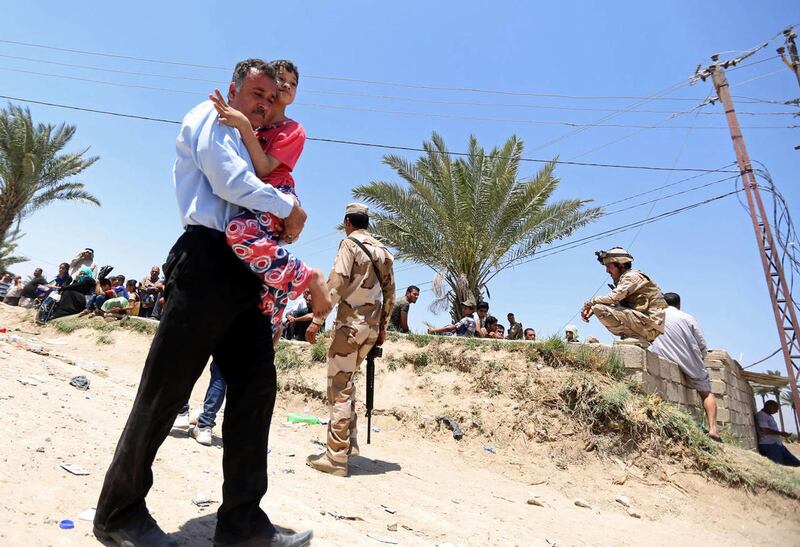The major territorial loss ISIS suffered a month ago in Tikrit, Iraq, may have been a cause for celebration among opponents of the jihadist group. But it has also served as a grim reminder of the major task of rebuilding communities ISIS has destroyed in its ongoing quest for land and power, according to news reports.
Zack Beauchamp of Vox reported that ISIS' inability to govern the territories it occupies not only hinders its strategic growth but hurts the people who live there, particularly in Iraq.
"ISIS is obsessed with taking over territory in which to establish a caliphate, but conquering territory isn't enough — holding it requires the group to govern the civilians who live there," Beauchamp explained. “ISIS’s rule is so destructive — both to infrastructure and basic communal trust among victimized Iraqis — that rebuilding stability and reestablishing control will be a monumental task for Iraq’s government.”
ISIS, or the Islamic State of Iraq and Syria, is a jihadist group with one main objective: rule over the Islamic world based on its interpretation of the Qur'an, which many Islamic scholars deem to be misconstrued.
Officially founded in 2006, ISIS did not begin to gain much traction or international attention until it seized Mosul, Iraq in 2014. Since then, the group’s conquered territories have pushed boundaries and scattered throughout Iraq and Syria. According to The New York Times, those territories include more than half of the Anbar Province of Iraq, and Raqqa, Syria, to name a few.
In the process of expanding territory, ISIS has discriminated against and victimized people of all religions and ethnicities through murder, rape, enslavement and displacement, according to a 2014-2015 Amnesty International Report, with numbers of victims climbing into the hundreds of thousands.
But before civilians became aware of ISIS’s brutality, they greeted its arrival with relief. In Iraq, the Sunni extremist group was viewed as a liberator from the Shi'a led government that had taken over since the U.S. invaded Iraq and overthrew Saddam Hussein.
Reminiscing upon the first day ISIS entered his city of Fallujah, Iraq, Abu Mohammed recalled the celebrations that filled the streets. “At the beginning … we were so happy and called it ‘the Islamic Conquest,’” he told The Independent. "Most of the people were offering them feasts and warmly welcoming their chief fighters.”
But the initial joy of the 53-year-old Sunni Muslim farmer was short-lived, and now he looks back on that day in January 2014 with contempt. He recalled the first six months of ISIS’ rule as relaxed and warm governance, with the group merely encouraging civilians to go to the mosque.
“But after the capture of Mosul it became obligatory, and anybody who violated the rule received 40 lashes,” he said.
This is one of many news reports trickling out of Iraq and Syria that paint the picture of life under ISIS control, where every aspect of daily life — from economics to diet — is dictated and the consequences of disobedience sometimes fatal.
In the town of Raqqa, Abu Obida, a patrol leader in the group Hisbah — a group that upholds ISIS mandate — explained his role to Vice News.
“My purpose is to establish the caliphate,” Obida stated. “And in order to make it happen in the way of the Prophet (Mohammed), we have to teach others what to do and what not to do.”
As they are riding along in their van, Obida directs the driver to pull over. He calls out to a man walking the streets of Raqqa, Syria, with his wife covered from head to toe.
“Tell (your wife) to change the fabric of her veil," Obida said. "And tell her not to hold her gown up, because we can see what she is wearing underneath.”
As Obida patrols the city, he questions others about their business operations: Are their tanks of gas filled with just gas, or are they half water? Are they selling their beef for the same price as their lamb?
“A large part of the Hisbah’s role is assuring that the shops and stores throughout the city are trading fairly,” Vice News' Medyan Dairies reported. “The patrol go door-to-door inspecting products, practices and pricing.”
After an interview with a refugee from Mosul, NPR reported: “(Mosul) is a city where beheadings and floggings became routine, and people believed to be heretics … could be sold as slaves.”
In addition to fear, ISIS's brutal governance has also created economic hardships on those under its rule.
“People suffer from lack of water and electricity, which they get from generators, because the public supply only operates three to five hours every two days,” Mohammed explained.
The prices of basic necessities have soared, with cooking gas rising to roughly $78 a cylinder, and a bag of flour increasing to more than $101, according to The Independent.
Email: smikati@deseretnews.com

